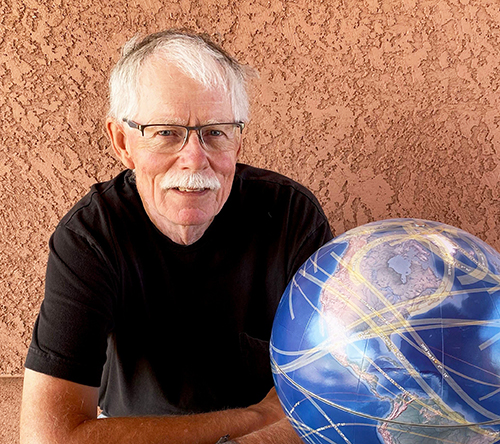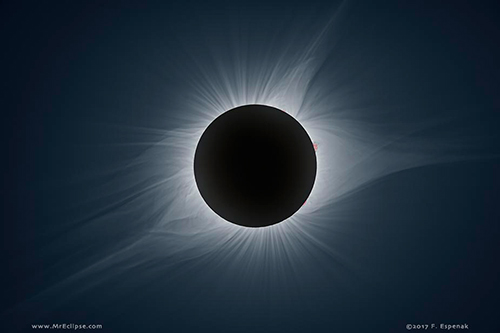To say a total solar eclipse is a life-changing experience is no hyperbole for Fred Espenak.
His life’s trajectory was set under such an eclipse in North Carolina in 1970. What he thought would be a once-in-a-lifetime experience turned into a passion for chasing the astronomical phenomenon around the globe and the well-earned moniker “Mr. Eclipse.”
 “It was so far beyond anything I could possibly have imagined,” Espenak said recently, recalling the first time he witnessed the moon pass between the sun and the Earth, casting an all-encompassing shadow along what’s known as the path of totality. He’s since experienced 30 total solar eclipses across all seven continents. “It was the most incredible, spectacular, beautiful thing I’d ever seen.
“It was so far beyond anything I could possibly have imagined,” Espenak said recently, recalling the first time he witnessed the moon pass between the sun and the Earth, casting an all-encompassing shadow along what’s known as the path of totality. He’s since experienced 30 total solar eclipses across all seven continents. “It was the most incredible, spectacular, beautiful thing I’d ever seen.
“I knew this could not be a once-in-a-lifetime event.”
Espenak, who earned a master’s degree in physics from The University of Toledo in 1976, will present the Doermann Distinguished Lecture at the Doermann Theatre inside University Hall at 7 p.m. Tuesday, March 12. In “Experiencing Totality: The Great Total Eclipse of 2024,” he’ll share his firsthand experiences chasing eclipses for more than 50 years as well as insights into what attendees can expect during the solar eclipse that will pass over Toledo on Monday, April 8.
A reception with light refreshments begins at 6 p.m., and Espenak will sign copies of his books immediately after the lecture.
Visitor parking is free between 5:30 and 9 p.m. in Lot 1N. To register for the free, public lecture or for more information, go to the Doermann Distinguished Lecture website. Advance registration is encouraged but not required.
“The College of Natural Sciences and Mathematics recognized Fred Espenak as its 2018-2019 Distinguished Alumni, and we’re pleased to welcome him back for the Doermann Distinguished Lecture,” said Marc Seigar, dean of the College of Natural Sciences and Mathematics, which presents the lecture. “Audiences will find his accounts and his expertise fascinating, especially as we gear up to experience totality for ourselves in Toledo on April 8.”
Espenak, a retired astrophysicist with NASA’s Goddard Space Flight Center, has curated three websites, written dozens of books and generated thousands of predictions and maps on the topic of eclipses. His photographs of the phenomenon have been published in numerous magazines, and one is featured on a stamp the U.S. Postal Service released to commemorate the most recent total solar eclipse whose path crossed the United States in 2017.
Espenak traces his fascination with eclipses to his childhood, when he experienced a partial eclipse over his grandparents’ home in Long Island, New York, in 1963. It fascinated the 11-year-old budding astronomer, who decided he needed to learn more about what he’d just seen. His research convinced him that a total eclipse would be even more spectacular, and he spent his teenage years anticipating the chance to see for himself during the next eclipse that would cross the United States in 1970.
“By 1970, I was 18,” he said. “I had just gotten a driver’s license, and I somehow convinced my parents to let me drive 600 miles unchaperoned to get into the path of the eclipse in North Carolina.”
It wouldn’t be his most extreme journey.
Before he completed his undergraduate degree in physics from Wagner College in Staten Island, Espenak had experienced two solar eclipses — that first life-changing eclipse in North Carolina in 1970, followed by a disappointingly cloudy sojourn to eastern Canada in 1972 — and was itching to see a third. But he knew it wouldn’t be so easy to again position himself along the path of totality.
 So he made a deal with his college’s alumni association to lecture in exchange for funds toward his trip to the Sahara Desert in 1973, beginning both the informal speaking circuit that he continues today and, as he says, “what turned out to be a lifelong pursuit of going to eclipses in remote parts of the world.”
So he made a deal with his college’s alumni association to lecture in exchange for funds toward his trip to the Sahara Desert in 1973, beginning both the informal speaking circuit that he continues today and, as he says, “what turned out to be a lifelong pursuit of going to eclipses in remote parts of the world.”
By 2003, that claim extended even to Antarctica.
“Antarctica was amazing,” Epsenak said, describing an eclipse-oriented tourist voyage he and his wife took with Quark Expeditions. “The trip started in South Africa, and we visited a number of sub-Antarctic islands along the way. We saw such incredible wildlife — beaches with tens of thousands of penguins. It was one of the most incredible trips we’ve ever been on.”
India, 1995, stands out as another favorite. On that trip he met his wife, Patricia Totten Espenak, who was another eclipse tourist visiting from the United States.
Espenak will share photos and stories from his travels during his lecture, as well as tips and insights into what first-timers can expect on April 8. Of foremost importance is safety, he said: Wear your specialized eclipse-viewing glasses to look toward the sun until totality, when it’s safe to take them off; in fact, viewers won’t be able to see anything at all through them at that point.
He’ll also make a case for traveling – if necessary – to experience totality.
Toledo is on the path of totality for 2024, but nearby regions to the north and west are not. UToledo will welcome the community to campus to view the eclipse beginning at noon on April 8, with food trucks, music and educational family-friendly activities lined up on Centennial Mall and seating available in the Glass Bowl. For more information, go to the UToledo eclipse website.
“No matter what you read or see about the eclipse, nothing compares to actually experiencing it with your own eyes,” Espenak said. “Don’t say, ‘I can see it on the 6 p.m. news,’ and don’t make the mistake of watching a partial eclipse outside the path of totality. There’s no comparison between the two of them. Seeing a total eclipse is something that should be on everyone’s bucket list.”